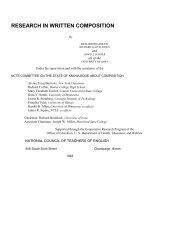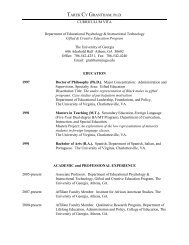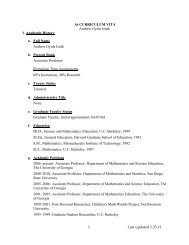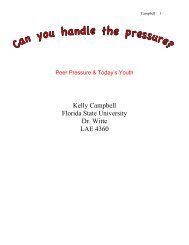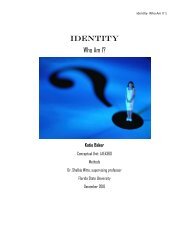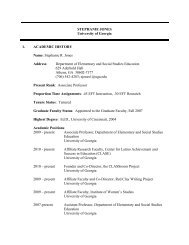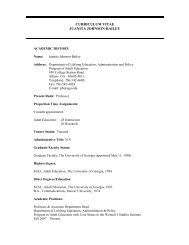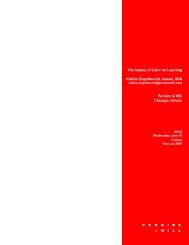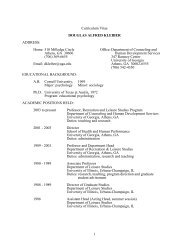A look into the stigma of mental illness in society by Lauren Niemeyer
A look into the stigma of mental illness in society by Lauren Niemeyer
A look into the stigma of mental illness in society by Lauren Niemeyer
Create successful ePaper yourself
Turn your PDF publications into a flip-book with our unique Google optimized e-Paper software.
Appendix F<br />
The Right to Refuse Treatment<br />
Grace E. Jackson, MD<br />
<strong>Niemeyer</strong> 36<br />
The right <strong>of</strong> a patient to refuse treatment is based upon five constitutional protections<br />
[1]:<br />
a. <strong>the</strong> 8 th amendment’s protection aga<strong>in</strong>st cruel and unusual punishment<br />
b. <strong>the</strong> 1 st amendment’s protection <strong>of</strong> free speech (freedom <strong>of</strong> thought / ideas)<br />
c. <strong>the</strong> 1 st amendment’s protection <strong>of</strong> freedom <strong>of</strong> religion<br />
d. <strong>the</strong> more broadly <strong>in</strong>terpreted right to privacy<br />
e. <strong>the</strong> 14 th amendment’s protection <strong>of</strong> liberty (<strong>the</strong> right to be free from unjustified<br />
<strong>in</strong>trusions on personal security).<br />
With<strong>in</strong> medic<strong>in</strong>e, <strong>the</strong>se constitutional guarantees have generally been unchallenged <strong>in</strong> <strong>the</strong><br />
case <strong>of</strong> physical (somatic) <strong>illness</strong>. In fact, <strong>the</strong>se protections constitute a competent<br />
<strong>in</strong>dividual’s right to accept or refuse an <strong>in</strong>tervention, based upon <strong>the</strong> pr<strong>in</strong>ciples <strong>of</strong> patient<br />
autonomy and <strong>in</strong>formed consent. With<strong>in</strong> psychiatry, however, <strong>the</strong>se guarantees have<br />
been variably <strong>in</strong>terpreted and restra<strong>in</strong>ed. First, <strong>the</strong> state has been permitted a range <strong>of</strong><br />
activities under its police authority, <strong>in</strong> which <strong>the</strong> rights <strong>of</strong> <strong>the</strong> public have superceded<br />
<strong>the</strong> rights <strong>of</strong> <strong>the</strong> <strong>mental</strong>ly ill [2]. Second, <strong>the</strong> state has been permitted a range <strong>of</strong><br />
activities under <strong>the</strong> doctr<strong>in</strong>e <strong>of</strong> parens patriae -- <strong>the</strong> 14 th century <strong>the</strong>ory which<br />
established <strong>the</strong> legitimacy <strong>of</strong> <strong>the</strong> state to act as guardian for those unable to care for<br />
<strong>the</strong>mselves [3].<br />
Given <strong>the</strong> steady rise <strong>of</strong> <strong>in</strong>voluntary treatment decisions with<strong>in</strong> <strong>the</strong> United States (e.g,<br />
more than forty states now authoriz<strong>in</strong>g coerced outpatient care), and <strong>the</strong> apparent<br />
acceptance <strong>of</strong> this phenomenon culturally, it is essential that <strong>mental</strong> health pr<strong>of</strong>essionals<br />
reexam<strong>in</strong>e <strong>the</strong> assumptions be<strong>in</strong>g made with<strong>in</strong> <strong>the</strong> legal and psychiatric communities.<br />
Assumption #1: A psychotic person who refuses medication (or ECT, or psychosurgery)<br />
does not know what he is say<strong>in</strong>g.<br />
A psychotic person who experiences halluc<strong>in</strong>atory or delusional perceptions may<br />
none<strong>the</strong>less rema<strong>in</strong> competent for <strong>the</strong> purposes <strong>of</strong> medical decision mak<strong>in</strong>g [4,5]. This<br />
competence may very well <strong>in</strong>clude cogent objections to <strong>the</strong> use <strong>of</strong> biological <strong>the</strong>rapies.<br />
Studies have demonstrated that schizophrenia, to name just one example, is <strong>by</strong> no means<br />
a globally impair<strong>in</strong>g condition for which <strong>the</strong> ability to consent to treatment must be<br />
automatically questioned or denied.<br />
Assumption #2: An <strong>in</strong>competent patient who decl<strong>in</strong>es medication must be protected <strong>by</strong> <strong>the</strong><br />
state, with <strong>the</strong> courts ensur<strong>in</strong>g <strong>the</strong> application <strong>of</strong> <strong>the</strong> psychiatric community’s standard <strong>of</strong><br />
care: pharmaco<strong>the</strong>rapy.



